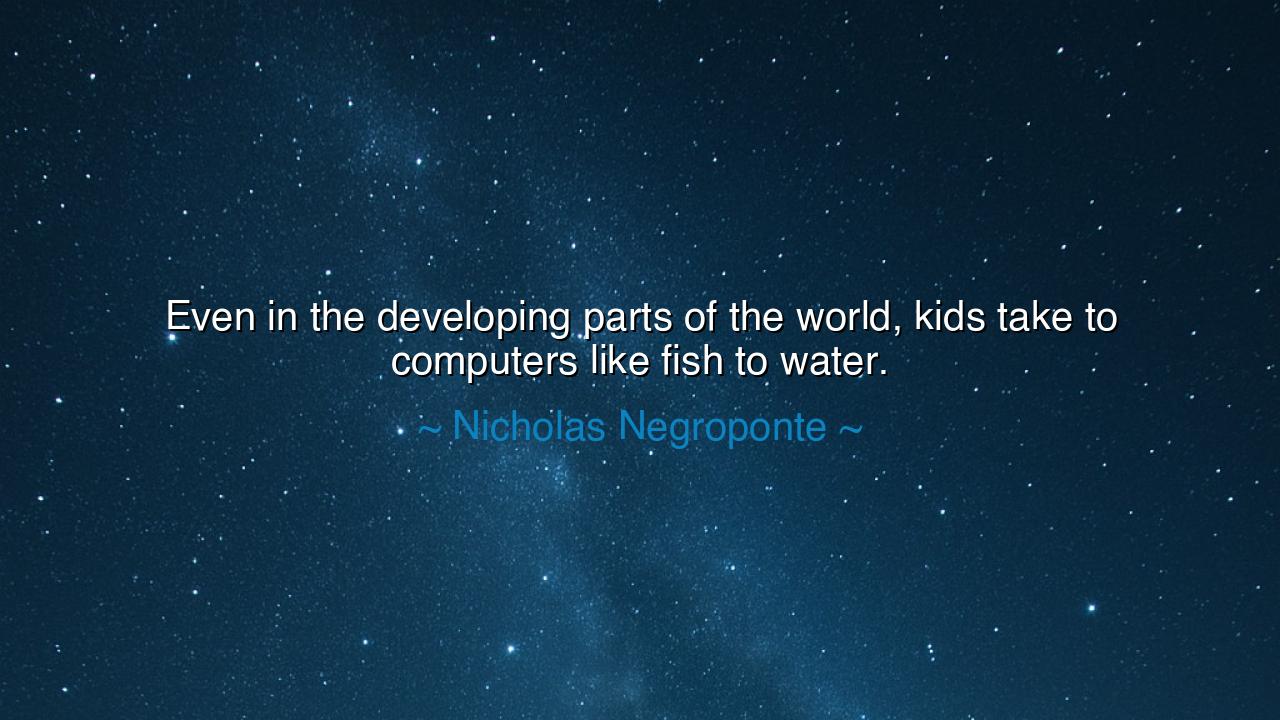
Even in the developing parts of the world, kids take to computers






In the ancient days, when humanity first began to chart the heavens and observe the workings of the natural world, there was a profound understanding that the young mind was like fertile soil, ready to absorb the seeds of knowledge. The young have always been the harbingers of change, the ones who take to new ideas and technologies with a zeal that often surpasses the understanding of their elders. The great thinkers of old, like Plato and Aristotle, recognized that the future rested in the hands of the youth, for it is they who carry forward the dreams of civilization. So it is, in our own age, Nicholas Negroponte speaks a powerful truth when he says, "Even in the developing parts of the world, kids take to computers like fish to water."
Negroponte’s words remind us of the timeless adaptability of the human spirit, especially in the young. Just as the ancient peoples, after countless generations of survival and innovation, discovered the wheel, the plow, and the sail, today’s children are discovering the digital world. The transition is seamless, almost instinctual, as though the very essence of technology is in their blood. The computer, that great invention of the modern age, is not a foreign entity to them but a natural extension of their curiosity and their need to connect with the world. Just as fish glide effortlessly through water, so do these young minds move through the digital world, mastering its complexities with ease and grace.
Consider the great age of exploration, when ancient sailors set out on perilous journeys to discover new lands. With their primitive tools—compasses, rudimentary maps, and the stars above—these explorers sought knowledge, each wave of the sea carrying them closer to discovery. And so it is today, as children in the developing world set sail into the digital ocean, armed with computers instead of sails and keyboards in place of rudders. It is a world they are entering not with fear, but with excitement and wonder. The technology that once seemed distant or exclusive is now accessible, a tool for learning and connection. Just as the explorers of old knew that knowledge was a treasure to be found, today’s youth are discovering the vast treasures of information and opportunity that await them in the digital realm.
In the ancient cultures of Egypt, Greece, and Rome, the wisdom of the elders was passed down to the young, often through oral traditions, where stories, lessons, and technologies were taught by word of mouth. Technology, in those days, was not the computer or the internet, but the tools of the everyday person—the spade, the chisel, the waterwheel—which were used to shape the world around them. The great minds, like Archimedes, knew that the key to progress lay in the ability to adapt and build upon the tools available. In many ways, today’s children are doing the same, taking the tools of the modern age—the computer, the tablet, the smartphone—and shaping their futures with them.
The children of the developing world, often seen as distant from the great technological advances of the West, are now embracing technology with a passion that rivals their counterparts in the most technologically advanced nations. The computer, once a symbol of exclusivity, is now a gateway for every child, regardless of their geography or background, to access the vast expanse of human knowledge. The young minds are not just learning how to use these machines—they are mastering them, shaping their world with a speed and fluency that could not have been imagined just a generation ago. The computer has become not just a tool, but a bridge, a connection between people and possibilities that were once distant dreams.
The lesson that we must take from Negroponte’s words is that the future is no longer a distant land, but a place that is being created by the youth—today’s children, who are the true inheritors of the digital age. As adults, we have a responsibility to ensure that these young minds have the resources, support, and guidance to navigate the vast ocean of knowledge and technology that lies before them. We must not hold them back, but rather, we must empower them to use the tools of the digital age for the greater good. Just as the great explorers of the past relied on maps and compasses to chart unknown territories, so too must we ensure that our children have the tools to chart their own course in this new world.
Practical action comes in the form of investing in education and access to technology for all children, not just in the developed world, but everywhere. Just as the ancient civilizations valued knowledge and the tools to unlock it, we must continue to foster environments where children can learn, explore, and innovate using the tools of the modern world. Whether through providing computers, internet access, or educational programs, we must ensure that the next generation has the opportunities to build upon the achievements of those who came before them. In doing so, we honor the legacy of progress, and we build a future where every child—like fish to water—can move effortlessly in the sea of possibility that is the digital age.






AAdministratorAdministrator
Welcome, honored guests. Please leave a comment, we will respond soon